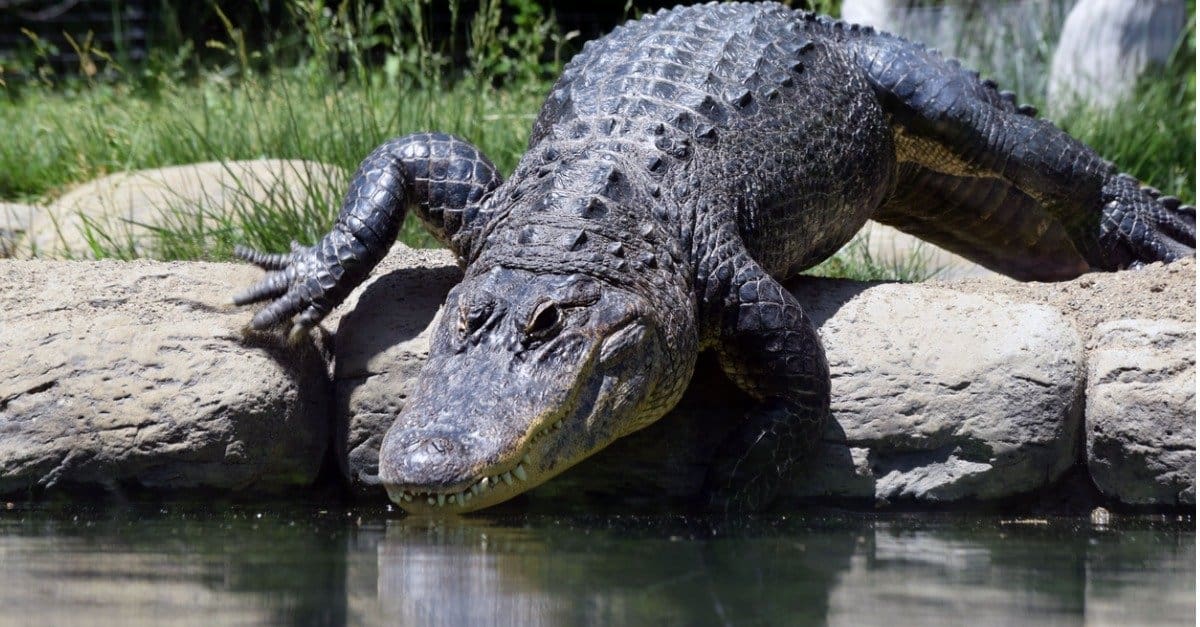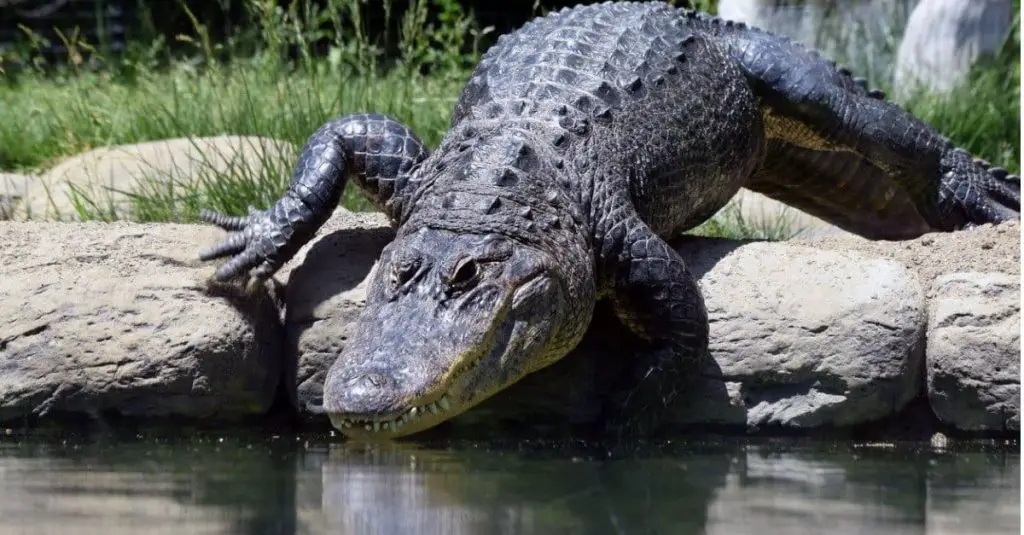Alligators are fascinating creatures that have been around for millions of years. They are known for their sharp teeth, powerful jaws, and ability to move quickly on land and in water. However, one of their most impressive traits is their ability to hold their breath for a surprisingly long time.
Have you ever wondered how long an alligator can stay underwater without coming up for air? It turns out that these impressive reptiles can hold their breath for up to two hours! In this article, we’ll explore the science behind this amazing feat and learn more about alligator behavior and biology.
Alligators can hold their breath for up to two hours. This is possible because they have a special valve in their throat that keeps water from entering their lungs. Alligators also slow their heart rate and restrict blood flow to their extremities, which helps them conserve oxygen. When they are ready to breathe again, they quickly exhale and inhale, and the process begins anew.

How Long Can an Alligator Hold Its Breath?
Alligators are fascinating creatures, with their powerful jaws and menacing appearance. But have you ever wondered how long these reptiles can hold their breath? In this article, we’ll explore the amazing ability of alligators to stay underwater for extended periods.
Physical Adaptations for Underwater Survival
Alligators are semi-aquatic animals that spend a lot of time in the water. They have several physical adaptations that allow them to survive underwater for extended periods. For starters, alligators have a special valve in their throats that allows them to close off their airways when they are submerged. This valve prevents water from entering their lungs, allowing them to hold their breath for longer periods.
Additionally, alligators have a slower metabolism compared to other animals, which means they require less oxygen to survive. They can also slow down their heart rate and blood flow to conserve oxygen while underwater. These adaptations allow alligators to remain submerged for up to two hours without needing to come up for air.
The Importance of Breath Holding for Alligators
Alligators use breath holding as a strategy to catch their prey. When hunting, alligators will lurk underwater, waiting for their prey to come near. Once they spot their prey, they will lunge out of the water, using their powerful jaws to capture the unsuspecting animal. The ability to hold their breath for extended periods allows alligators to stay hidden underwater, making them more effective hunters.
In addition to hunting, alligators also use breath holding as a survival tactic. During periods of drought, alligators will dig into the mud at the bottom of a swamp or pond and remain there until conditions improve. By holding their breath and slowing down their metabolism, alligators can survive for long periods without access to air.
Benefits of Breath Holding for Alligators
The ability to hold their breath for extended periods gives alligators a significant advantage in their environment. It allows them to remain hidden from predators and catch prey more effectively. Additionally, breath holding helps alligators conserve energy and survive during times of environmental stress.
Alligators vs. Other Animals
Alligators are not the only animals that can hold their breath for extended periods. Many other aquatic animals, such as whales and dolphins, also have adaptations that allow them to stay underwater for extended periods. However, alligators are unique in that they can hold their breath for up to two hours, which is longer than most other animals.
How Breath Holding Affects Alligator Behavior
The ability to hold their breath for extended periods also affects alligator behavior. Alligators are more active and aggressive during the warmer months when the water is warmer. This is because warm water temperatures increase their metabolism, allowing them to hold their breath for longer periods. During the colder months, alligators are less active and spend more time basking in the sun to conserve energy.
Alligator Breathing Patterns
Alligators have a unique breathing pattern that allows them to maximize their oxygen intake. When they come up for air, alligators will take a deep breath, filling their lungs and then hold their breath while they are underwater. When they resurface, they will exhale the used air and take another deep breath, repeating the process.
Alligator Breathing and Conservation Efforts
Alligators were once an endangered species due to overhunting and habitat loss. However, thanks to conservation efforts, their populations have rebounded in recent years. One of the strategies used to conserve alligators is to monitor their breathing patterns. By studying the breathing patterns of alligators, conservationists can determine the health and well-being of these animals.
Conclusion
Alligators are fascinating creatures that have many adaptations that allow them to survive in their aquatic environment. Their ability to hold their breath for extended periods is just one of the many skills that make them formidable predators. Understanding how alligators breathe and survive can help us appreciate these amazing creatures and work to protect them for future generations.
Frequently Asked Questions
In this section, we answer some of the most common questions about alligators and their unique abilities.
What is the normal breath-holding time of an alligator?
Alligators are known for their ability to hold their breath for a long time while underwater. The average breath-holding time for an alligator is around 20-30 minutes, depending on the species and size of the individual. This impressive feat is made possible by the alligator’s specialized lungs and circulatory system, which allow them to conserve oxygen and slow down their heart rate while submerged.
However, it’s important to note that alligators don’t hold their breath continuously for the entire duration. Instead, they periodically surface to breathe before diving back down again. This behavior is called “logrolling,” and helps the alligator conserve energy while staying underwater for extended periods.
Can alligators survive for long periods underwater?
Alligators are well adapted to life in and around water, and can survive for extended periods underwater if necessary. While they typically surface to breathe every 10-15 minutes, they are capable of staying submerged for much longer if needed. In fact, alligators have been known to survive for up to 24 hours underwater by slowing down their metabolism and conserving oxygen.
However, prolonged periods underwater can be stressful for alligators and can lead to a weakened immune system and other health problems if they don’t have access to air and sunlight for extended periods. Additionally, alligators can become disoriented and confused if trapped underwater for too long, making it difficult for them to find their way back to the surface.
How do alligators hold their breath for so long?
Alligators have several unique adaptations that allow them to hold their breath for extended periods while underwater. First, they have specialized lungs that can store a large amount of oxygen and release it slowly over time. Additionally, alligators can slow down their heart rate and divert blood flow away from their extremities and towards their vital organs, allowing them to conserve oxygen and stay underwater for longer periods.
Alligators also have a special valve in their throat called a glottis, which allows them to close off their airway while underwater. This prevents water from entering their lungs and allows them to conserve oxygen while submerged. Finally, alligators can “logroll” or rotate their body while submerged, which allows them to stay underwater for longer periods without using as much energy.
Can alligators drown?
While alligators are well adapted to life in and around water, they are still susceptible to drowning if they become trapped or disoriented underwater. For example, alligators can become tangled in fishing nets or other debris and may be unable to surface for air. Additionally, alligators can become disoriented in murky water or if they are startled, making it difficult for them to find their way back to the surface.
However, drowning is relatively rare for alligators, as they are skilled swimmers and are generally able to avoid getting trapped or disoriented underwater. Additionally, alligators are highly resilient animals and can recover from near-drowning experiences if they are able to get to the surface and breathe air again.
What is the longest recorded breath-holding time for an alligator?
While alligators are known for their impressive breath-holding abilities, it’s difficult to determine the exact duration of their longest dives in the wild. However, researchers have conducted experiments on captive alligators to measure their breath-holding capabilities, with some individuals being able to hold their breath for over an hour.
It’s important to note that these experiments were conducted under controlled conditions and may not accurately reflect the alligator’s natural behavior in the wild. Additionally, prolonged periods underwater can be stressful for alligators and can lead to health problems if they don’t have access to air and sunlight for extended periods.
How long can animals hold their breath | how long can animals hold their breath underwater
In conclusion, alligators are impressive creatures that have the ability to hold their breath for extended periods of time. This skill allows them to hunt and survive in their natural habitats, such as swamps and rivers. However, it is important to remember that alligators are wild animals and should be treated with caution and respect.
Overall, the question of how long an alligator can hold its breath is fascinating and has captured the curiosity of many. While the answer may vary depending on the size and species of the alligator, it is clear that they are capable of staying underwater for extended periods of time. This ability has helped them thrive in their environments and become apex predators in their ecosystems.
In the end, learning about the unique abilities of animals such as alligators can help us appreciate and understand the natural world around us. By respecting and protecting these creatures, we can ensure that they continue to thrive for generations to come.


